Friday, May 6, 2016
As Teeco Products (Irvine, Calif.) celebrates its 70th anniversary, its new president, Bob Bailey, looks toward the future while reminiscing about the past that has grown the company from a one-man operation to what it is today. 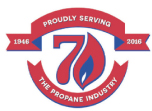
Bailey, who joined the wholesale gas equipment distributing and fabricating company in 1989, notes that although the company is known for its products and services, it recognizes the importance of its past leaders and their involvement in the propane industry. To that end, four Teeco presidents have served as chair of the Western Propane Gas Association: Bennett C. Tilden (1960-1961), Mike Ball (1974-1975), John Andrews (1995-1996), and Dwaine Goodwin (2008-2009).
“Teeco Products always had the philosophy that we understand the importance of the association and how we always want to give back to the industry that gives us a lot,” said Bailey, who assumed the title of executive vice president and COO after Goodwin retired. He was appointed president of the company in January of this year.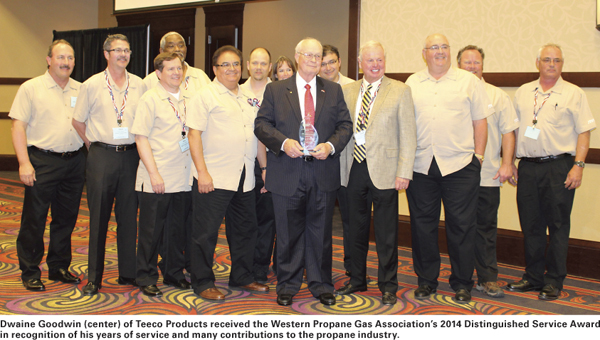
Teeco has been part of the propane industry since 1946. At the end of World War II, demand skyrocketed for residential, commercial, and industrial goods, and the LP-gas industry responded to a great deal of that demand. Tilden began filling the growing equipment requirements of the LP-gas dealers, selling cylinders, copper tubing, and Bastian-Blessing Co. (now RegO) regulators and valves.
To meet customer needs, Tilden realized LP-gas dealers would require brass fittings, so he started carrying them in the trunk of his car. Business was strong, so Tilden began working out of a “warehouse,” a 10x15-ft rented garage in Los Angeles, and that marked the beginning of Tilden Engineering and Equipment Co. (Teeco). Four years later, after outgrowing several more facilities, he relocated to the central California city of Fresno, where it remained for four years. As sales continued to grow, the company moved back to Southern California, and the staff at Teeco grew from one to 19. Among those joining Tilden were employees who would play a significant role in shaping the company in succeeding years. They were M.F. (Mike) Ball, John Parkhouse, Gene Hardester, and D.M. (Marshall) Etter.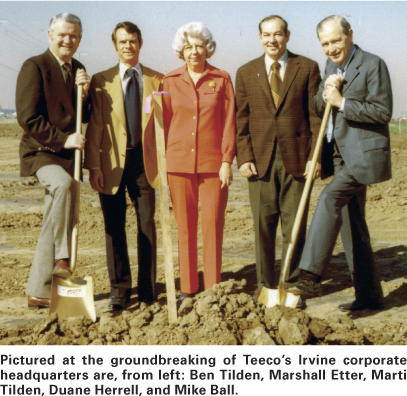
On the West Coast during the 1950s, Teeco’s LP-gas company customers experienced major growth, fueled by new start-ups, acquisitions, and mergers. Petrolane Gas Service, Suburban Gas (Doxol and Uregas), Van Gas, Pargas, California Liquid Gas Corp. (Cal-Gas), and Unigas acquired new customers and were instrumental in developing innovative and expanded uses for LP-gas. This growth necessitated another move.
Teeco settled into a 20,000-sq-ft warehouse in Anaheim, Calif. In the 1970s, as many markets were maturing, the future was bright for Teeco. It serviced the 11 western states, and its customers were strong and well-established companies. When a fire destroyed the Anaheim facility, the company proved its resilience by keeping operations going, and within a year had completely moved into its new Irvine, Calif. facility. Tilden retired and sold the company to Leonard Andrews in 1976, about the same time that an oil crisis created demand for carburetion equipment and infrastructure.
The 1970s drew to a close with the LP-gas industry actively embroiled in vehicle conversions. This growing market caused by the second “oil crisis” created strong demand for carburetion equipment and all of the support equipment to build the necessary infrastructure. Teeco continued growing, adding a new 24,000-sq-ft warehouse in Auburn, Wash. and a facility in North Highlands, Calif. to meet the growing requirements of LP-gas dealers in the Bay area.
In the 1980s, carburetion equipment demand declined, and Teeco adjusted by focusing on new markets. In 1989, the company acquired PACA (Pacific Carburetion Assembly), where Bailey was general manager. He joined Teeco when it built its Sacramento facility and an operating unit of equipment distribution, truck/vehicle fabrication and service, dispenser fabrication, LP-gas carburetion conversion and service, and engineering and construction. These events allowed Teeco to concentrate on growing its efficiencies in distribution and to acquire new product lines that greatly expanded its service capabilities.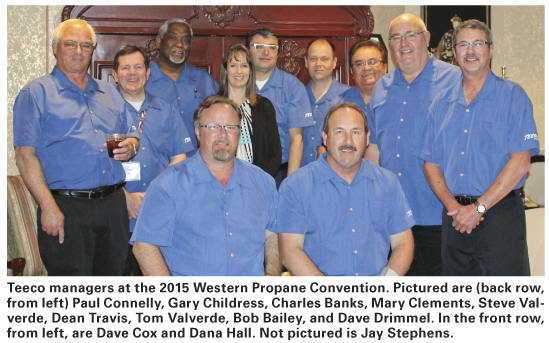
Describing the new Sacramento facility, Bailey commented, “It met our needs in the fabrication side of the business as well as the distribution. It’s a 50,000-sq-ft facility and has a 25,000-sq-ft warehouse, a 16,000-sq-ft shop, and the rest is office.” But at the close of the 1990s, it became apparent that the Sacramento facility could become a true “super-store” for LP-gas dealers in the West. Teeco consolidated its Irvine and Sacramento inventories and warehouse functions into Sacramento, providing full service from a single location to all LPG dealers and other related markets.
Bailey has not seen much change over the years in the types of products customers demand. “In the propane industry, things don’t change a lot,” he said. But Teeco has stepped up its use of technology by adding a website, a B-to-B store site for customers, and an electronic catalog, “so business has changed that way. How we communicate to our customers back and forth has all changed.”
“We see the orders electronically, process them through our system, they’re shipped … and we’re paid electronically.” Customers are now able to conduct business with Teeco 24 hours per day.
The company is always on the lookout for new markets and new products. It sees the autogas market as having great growth potential and has developed dispensers and other autogas products. Teeco is also emphasizing the construction end of its business. It holds a California contractor’s license and has been constructing bulk plants and “anything related to the propane business,” Bailey noted. As propane marketers grow their autogas business, Teeco will offer them products to assist in that growth.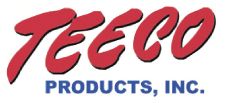
Part of Teeco’s anniversary celebration will include paying tribute to many of the people who contributed, including Ben and Martha Tilden, Leonard Andrews, Ball, Hardester, Parkhouse, Etter, Ed Albertoni, and Goodwin.
The company hopes many customers visit its hospitality room at the Western Propane Gas Association convention in Reno this month, where it will feature an anniversary party. In September, the Nevada Propane Dealers Association will honor Teeco with its “Hall of Flame” award for its support over the years. Teeco also plans an anniversary celebration at its open house in Sacramento in October.
In addition to its support of the Western and Nevada associations, Teeco has been involved with most of the state associations in its service area, and according to Bailey, that support will continue.
“By getting involved and supporting their events, the industry will grow, and that benefits Teeco and the dealers,” Bailey said. “Ever since I came to Teeco, the philosophy of getting involved in the association was drummed into all of us, so we always made sure we had people involved who sat on the committees. We were there to sponsor and help at different events, because we know who feeds us.”

Bailey, who joined the wholesale gas equipment distributing and fabricating company in 1989, notes that although the company is known for its products and services, it recognizes the importance of its past leaders and their involvement in the propane industry. To that end, four Teeco presidents have served as chair of the Western Propane Gas Association: Bennett C. Tilden (1960-1961), Mike Ball (1974-1975), John Andrews (1995-1996), and Dwaine Goodwin (2008-2009).
“Teeco Products always had the philosophy that we understand the importance of the association and how we always want to give back to the industry that gives us a lot,” said Bailey, who assumed the title of executive vice president and COO after Goodwin retired. He was appointed president of the company in January of this year.

Teeco has been part of the propane industry since 1946. At the end of World War II, demand skyrocketed for residential, commercial, and industrial goods, and the LP-gas industry responded to a great deal of that demand. Tilden began filling the growing equipment requirements of the LP-gas dealers, selling cylinders, copper tubing, and Bastian-Blessing Co. (now RegO) regulators and valves.
To meet customer needs, Tilden realized LP-gas dealers would require brass fittings, so he started carrying them in the trunk of his car. Business was strong, so Tilden began working out of a “warehouse,” a 10x15-ft rented garage in Los Angeles, and that marked the beginning of Tilden Engineering and Equipment Co. (Teeco). Four years later, after outgrowing several more facilities, he relocated to the central California city of Fresno, where it remained for four years. As sales continued to grow, the company moved back to Southern California, and the staff at Teeco grew from one to 19. Among those joining Tilden were employees who would play a significant role in shaping the company in succeeding years. They were M.F. (Mike) Ball, John Parkhouse, Gene Hardester, and D.M. (Marshall) Etter.

On the West Coast during the 1950s, Teeco’s LP-gas company customers experienced major growth, fueled by new start-ups, acquisitions, and mergers. Petrolane Gas Service, Suburban Gas (Doxol and Uregas), Van Gas, Pargas, California Liquid Gas Corp. (Cal-Gas), and Unigas acquired new customers and were instrumental in developing innovative and expanded uses for LP-gas. This growth necessitated another move.
Teeco settled into a 20,000-sq-ft warehouse in Anaheim, Calif. In the 1970s, as many markets were maturing, the future was bright for Teeco. It serviced the 11 western states, and its customers were strong and well-established companies. When a fire destroyed the Anaheim facility, the company proved its resilience by keeping operations going, and within a year had completely moved into its new Irvine, Calif. facility. Tilden retired and sold the company to Leonard Andrews in 1976, about the same time that an oil crisis created demand for carburetion equipment and infrastructure.
The 1970s drew to a close with the LP-gas industry actively embroiled in vehicle conversions. This growing market caused by the second “oil crisis” created strong demand for carburetion equipment and all of the support equipment to build the necessary infrastructure. Teeco continued growing, adding a new 24,000-sq-ft warehouse in Auburn, Wash. and a facility in North Highlands, Calif. to meet the growing requirements of LP-gas dealers in the Bay area.
In the 1980s, carburetion equipment demand declined, and Teeco adjusted by focusing on new markets. In 1989, the company acquired PACA (Pacific Carburetion Assembly), where Bailey was general manager. He joined Teeco when it built its Sacramento facility and an operating unit of equipment distribution, truck/vehicle fabrication and service, dispenser fabrication, LP-gas carburetion conversion and service, and engineering and construction. These events allowed Teeco to concentrate on growing its efficiencies in distribution and to acquire new product lines that greatly expanded its service capabilities.

Describing the new Sacramento facility, Bailey commented, “It met our needs in the fabrication side of the business as well as the distribution. It’s a 50,000-sq-ft facility and has a 25,000-sq-ft warehouse, a 16,000-sq-ft shop, and the rest is office.” But at the close of the 1990s, it became apparent that the Sacramento facility could become a true “super-store” for LP-gas dealers in the West. Teeco consolidated its Irvine and Sacramento inventories and warehouse functions into Sacramento, providing full service from a single location to all LPG dealers and other related markets.
Bailey has not seen much change over the years in the types of products customers demand. “In the propane industry, things don’t change a lot,” he said. But Teeco has stepped up its use of technology by adding a website, a B-to-B store site for customers, and an electronic catalog, “so business has changed that way. How we communicate to our customers back and forth has all changed.”
“We see the orders electronically, process them through our system, they’re shipped … and we’re paid electronically.” Customers are now able to conduct business with Teeco 24 hours per day.
The company is always on the lookout for new markets and new products. It sees the autogas market as having great growth potential and has developed dispensers and other autogas products. Teeco is also emphasizing the construction end of its business. It holds a California contractor’s license and has been constructing bulk plants and “anything related to the propane business,” Bailey noted. As propane marketers grow their autogas business, Teeco will offer them products to assist in that growth.

Part of Teeco’s anniversary celebration will include paying tribute to many of the people who contributed, including Ben and Martha Tilden, Leonard Andrews, Ball, Hardester, Parkhouse, Etter, Ed Albertoni, and Goodwin.
The company hopes many customers visit its hospitality room at the Western Propane Gas Association convention in Reno this month, where it will feature an anniversary party. In September, the Nevada Propane Dealers Association will honor Teeco with its “Hall of Flame” award for its support over the years. Teeco also plans an anniversary celebration at its open house in Sacramento in October.
In addition to its support of the Western and Nevada associations, Teeco has been involved with most of the state associations in its service area, and according to Bailey, that support will continue.
“By getting involved and supporting their events, the industry will grow, and that benefits Teeco and the dealers,” Bailey said. “Ever since I came to Teeco, the philosophy of getting involved in the association was drummed into all of us, so we always made sure we had people involved who sat on the committees. We were there to sponsor and help at different events, because we know who feeds us.”

